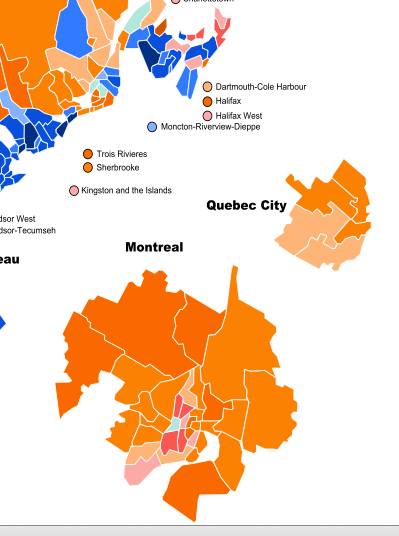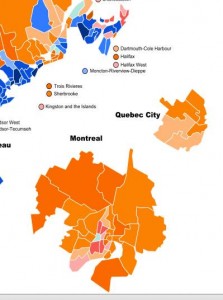
At first, I was somewhat ambivalent about my stance on the Quebec Charter of Values.
Nicholas Banerd <Contributor>

I have always fervently supported the idea of a secular state. The Parti Quebecois’ ban on religious symbols would only apply to state-workers, and citizens seeking government services.
The ban does not go so far as restrictions in France, which bans face coverings in all public areas and restricts religious symbols among pupils in schools. However, I question whether a postman wearing a turban or a nurse wearing a hijab would indeed convey the pernicious message that the relevant religion is sponsored or supported by the state. In a heavily-criticized open letter by a group of female Quebec public figures dubbed “the Janettes,” the authors suggested that they “would be afraid to be treated by a Muslim doctor wearing a veil.” Thus, despite their so-called secularist agenda, and the equal burden on the Judeo-Christian populace to remove their “conspicuous” kippahs and crucifixes, the PQ is again tainted by claims of racism and intolerance (à la Jacques Parizeau, circa 1995). Ironically, a doctor wearing a kippah recently treated Mme. Marois herself at Montreal’s Jewish Hospital. The PQ would need to call a new election, and win a majority in order to pass the Charter of Values, or else negotiate with the CAQ powerbrokers, who have called for significant revisions to the original draft.
Either way, the Charter of Values would almost uncertainly be ruled unconstitutional by the Supreme Court under s.15. Subject to popular support and the views of her caucus, Marois could invoke the notwithstanding clause (an override even Liberal Premiers such as Mr. Bourassa and Mr. Charest have used on the subjects of public schools and language); defying the Supreme Court while parroting the now-banal fact that Quebec never signed CA 1982. Mr. Mulroney tried his best to rectify this, as the skeletons of Meech and Charlottetown still lie un-exhumed in the bone yard of Canadian constitutional amendments. I don’t think the Quebec Charter is as terrible and wretched as some claim, but we can probably all agree that in such cases, believers forced to remove their garb would be harmed much more (deleterious effects) than the public benefit the ban would create, if any (salutatory effects). These terms were added to the Oakes Test to determine whether an abrogation of rights is justifiable under s.1 of the Canadian Charter.
Furthermore, enforcement would be a nightmare. How could one possibly determine whether a crucifix is “conspicuous” enough to constitute a violation? New Montreal police recruits are equipped with a handgun, a badge, and now, a measuring tape. Third party polls draw mixed conclusions: while popular support for the Quebec Liberal party has increased past that of the PQ, fifty-four per cent of respondents say they support the religious symbol aspect of the ban, while 38 per cent said they are against it. The stakes are high for Marois, and I doubt she’d risk a December election, when many of her supporters would likely be snowed-in their Saguenay log cabins huddled around the fireplace.
The ban would likely bear negative economic consequences, discouraging immigration from French-speaking Christian/Muslim countries which the province seeks to attract. Most of the international community and the rest of Canada oppose the ban; Toronto-based columnists have made a hobby of berating Marois. One side screams racism, the other, sexism. Surprisingly, the winner in all this appears to me to be a federal party: Justin Trudeau’s Liberals. While the NDP swept Anglophone and immigrant ridings in 2011, its equally large constituency in rural Quebec (where Charter of Values support is strongest) has forced Mr. Mulcair to rather bashfully skirt the issue. It was always fairly clear that the NDP’s sweep of Quebec was almost entirely due to the late Mr. Layton, and may well prove to be a one time fluke (Quebec voters are notoriously fickle). As an aside, however, “Vegas Girl,” the Ottawa bartender turned Quebec MP who won while partying her whole campaign on the Strip, is reportedly “doing an excellent job” in her new role.
Mr. Trudeau, on the other hand, now leads in popular support. He can probably count on retaking the traditionally Liberal Anglophone bastions of West Montreal and the Eastern Townships, and his anti-Charter of Values stance will likely allow him to wrest many orange-colored immigrant ridings in both Montreal and Quebec City from Mulcair. This leaves the BQ, NDP and Conservatives to duke it out in the suburbs and rural areas. I’m hoping religious/immigrant communities in “la belle province” are not dissuaded from supporting Mr. Trudeau’s platform to legalize marijuana. Perhaps he can even attract some “pure laine” votes from the ranks of the young and progressive Québécois. Young enough, at least, to have forgotten the popular ire of decades ago, still perpetuated in some quarters by the ghost of his father.
